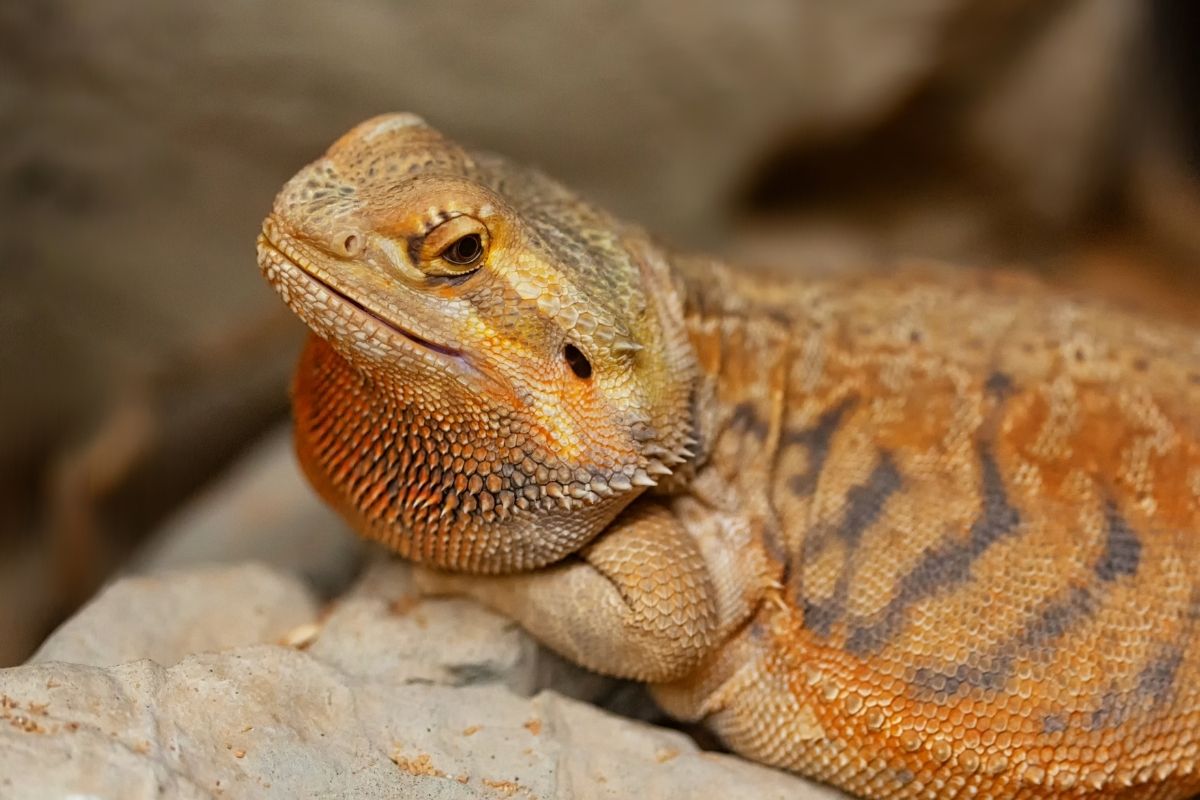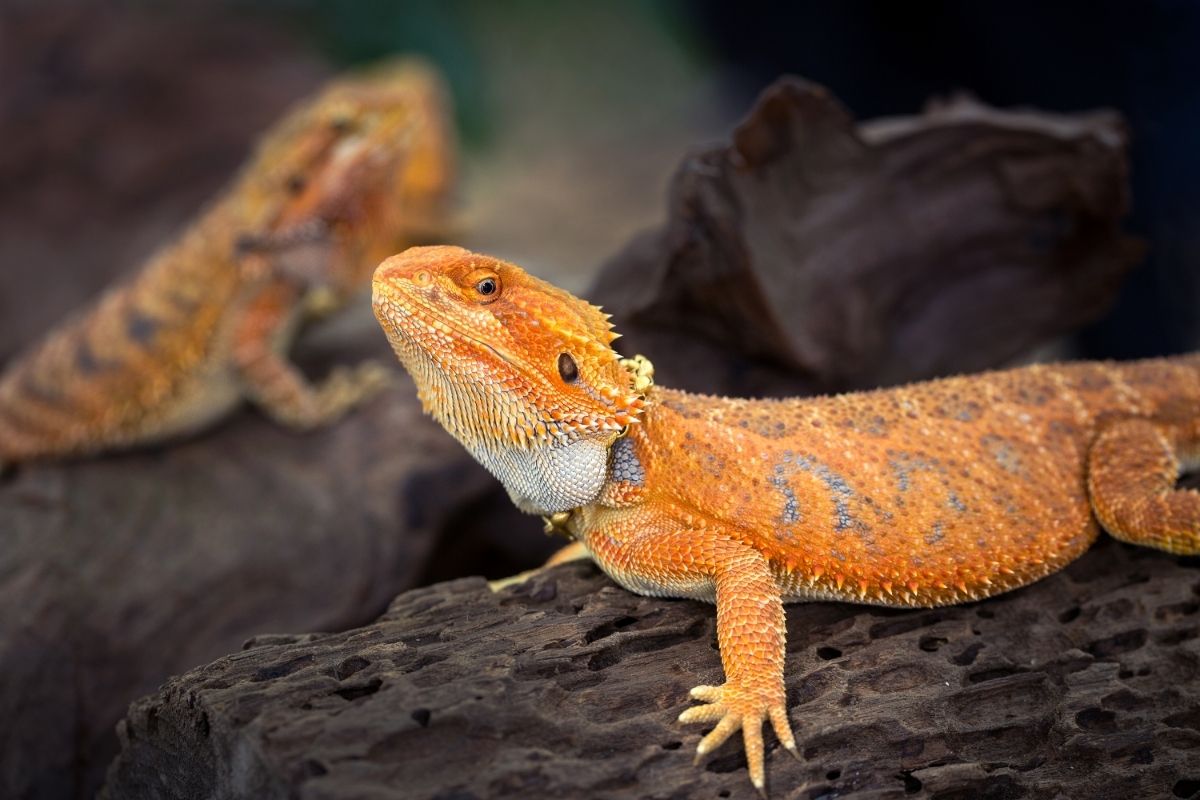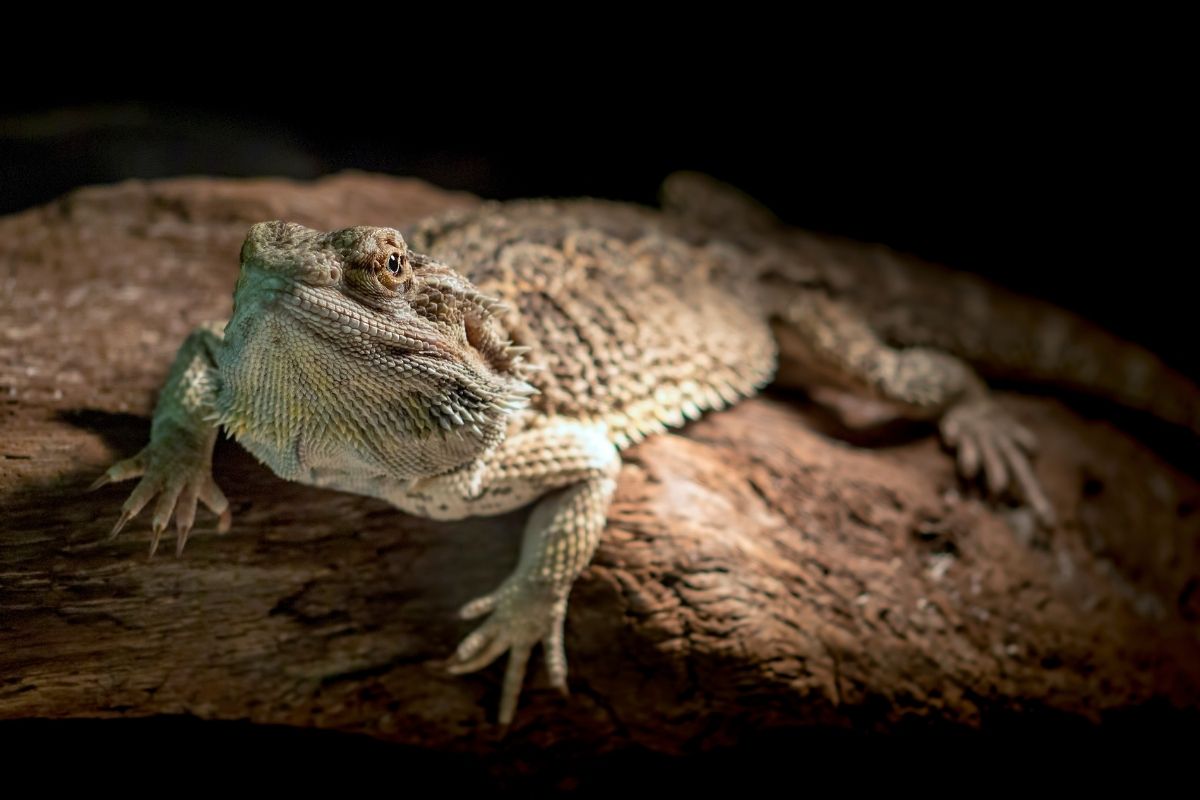Any bearded dragon owner will tell you that they’re just about the coolest pet in the world!
What more could you want than a gorgeous, minimal-fuss creature to share your company with?

However, just like any other kind of pet, bearded dragons require a healthy, balanced diet to stay in good shape and fight off any kinds of diseases that could befall them.
Blackberries are one of the foods that you can feed to your bearded dragon safely.
However, you should be wary not to feed them too many at once.
In this article, we’ll be taking a closer look at the recommended diets of bearded dragons and helping you find the best way to keep your little friend in tip-top condition!
Blackberries
Let’s start by taking a look at blackberries themselves.
They’re actually berries, which means that they have seeds inside them.
These seeds are very nutritious for reptiles because they contain lots of protein and minerals, including calcium, iron, phosphorus, potassium, and magnesium.
The seeds also provide essential fatty acids that help with digestion and metabolism, as well as vitamin E, which helps protect against oxidative stress.
So if you’re looking for an easy, safe food to give your bearded dragon, then blackberries are definitely a great option.
But what exactly do you need to know before you start feeding them?
How Much Should I Feed Them?
When it comes to how much you should feed your bearded dragon, there is no set rule or guideline.
It really depends on their size, age, and health.
If you’ve got a small bearded dragon who is still growing, then you may only need to feed them around 1/4 cup of blackberries every week.
If you’ve already got a large adult bearded dragon, then you might be able to feed them up to 1 cup of blackberries per week.
However, it should be noted that your bearded dragon shouldn’t eat this quantity of blackberries all in one go. Instead, it should be spread throughout the week.
What Happens If My Bearded Dragon Eats Too Many Blackberries?
As mentioned earlier, blackberries are high in certain nutrients, so they can cause some problems when eaten in excess.
For example, they can cause diarrhea, stomach upset, and even vomiting.
This is why it’s important to make sure that your bearded dragon doesn’t overeat these fruits.
You definitely don’t want to end up having to spend time cleaning out their tank after they’ve had too many of them!
But what is it about blackberries that can cause these health problems?
Sugar
One reason your bearded dragon shouldn’t eat too many blackberries in one go is that they’re very high in sugar.
Other than the odd fruity snack here and there, bearded dragons don’t have a whole lot of sugar in their natural diet.
In fact, bearded dragons tend to live best on low-sugar diets because it lowers the risk of them becoming obese or having blood pressure and heart issues.
Oxalates
Another thing that makes blackberries dangerous for bearded dragons is that they contain oxalic acid.
This chemical compound has been linked to kidney stones and bladder stones in humans and animals.
While it’s unlikely that your bearded dragon will get either type of stone, it’s always best to avoid foods that could potentially harm them.
The main issue with oxalates for bearded dragons is that they steal calcium from the rest of the body.
In humans, calcium is important to promote healthy bones and the same is true in bearded dragons.
Therefore, too much exposure to oxalates in blackberries or any other fruit could lead to metabolic bone disease or other bone structure problems.
Overhydration
Blackberries also contain lots of water, which means they’ll leave your bearded dragon feeling bloated and uncomfortable.
Bearded dragons aren’t used to eating a lot of water, so if they consume too many blackberries, they can become overhydrated.
Overly hydrated reptiles often experience diarrhea and other gastrointestinal symptoms.
So while you certainly don’t want to stop giving your bearded dragon blackberries altogether, you should try to limit the amount they eat in one go.
Fiber
Finally, blackberries also contain fiber, which isn’t something that most reptiles like to eat.
Fiber helps keep your bearded dragon’s digestive system working properly, as well as helping prevent constipation.
However, if your bearded dragon eats too many berries at once, you may notice signs of bloating, gas, or diarrhea.
If this happens, then it might be time to consider reducing the number of blackberries they eat.
Why Should You Feed Blackberries To Your Bearded Dragon?

So far, we’ve heard plenty of reasons why you shouldn’t feed too many blackberries to your bearded dragon, but there must be some reasons why it’s a good thing, right?
Vitamins
First off, blackberries are an excellent source of vitamin C, which is essential for maintaining healthy skin and keeping your bearded dragon looking its best.
They also contain vitamins A and E, both of which help support your reptile’s immune system.
These two vitamins are especially helpful when it comes to preventing common illnesses such as colds and flu.
Calcium
Also, blackberries are rich in calcium, which is vital for building strong bones.
If you’re worried about your bearded dragon getting osteoporosis, then feeding him blackberries is a great way to ensure he gets enough calcium.
It’s also worth noting that calcium is necessary for proper muscle function, nerve impulse transmission, and hormone production.
All of these things are critical for a healthy reptile.
Antioxidants
Blackberries also have high levels of antioxidants, which are compounds that protect against free radicals and toxins.
Free radicals are molecules that damage cells, causing cell death.
Free radical scavengers work by binding to free radicals and neutralizing them before they cause harm.
The antioxidant properties of blackberries make them beneficial for your bearded dragon’s health, particularly because they can help reduce the risk of certain diseases.
Minerals
Lastly, blackberries also contain minerals, including potassium, phosphorus, magnesium, iron, copper, zinc, manganese, selenium, and iodine.
These minerals play a key role in regulating bodily functions, including digestion, metabolism, and growth.
For example, zinc is important for wound healing, while copper supports the formation of red blood cells.
Potassium is also important for maintaining electrolyte balance, which is crucial for a healthy body.
While it’s true that blackberries aren’t the only food that contains all of these nutrients, they do offer a lot more than just calories.
In fact, they’re so nutritious that they could potentially even replace other foods as part of a balanced diet.
How To Make Sure Your Bearded Dragon Doesn’t Get Sick From Eating Too Many Berries
Now that we know what makes blackberries so special, let’s take a look at how you can avoid any problems with your bearded dragon after giving them too many berries.
First, you need to understand that if your bearded dragon eats too much fruit, they may not be able to digest it properly.
This means that they’ll end up having diarrhea or constipation, which will lead to dehydration.
If they have a hard time digesting fruits, then they won’t get the nutrition they need from eating them.
If this happens, they may become lethargic, lose weight, and eventually die.
So, the first step towards making sure your bearded dragon doesn’t suffer from digestive issues is to feed them fresh, ripe fruits.
You should never give your bearded dragon anything that isn’t fully ripe, or else there’s a chance that they might experience gastrointestinal distress.
Make sure that you don’t overfeed your bearded dragons either.
They shouldn’t really eat more than half their daily caloric intake from fruits.
If you notice that your bearded dragon has been overeating, then you should cut back on the amount of fruit they eat until they’ve had enough to satisfy their appetite.
However, keep in mind that some reptiles prefer to eat seeds instead of whole fruits.
If you want to ensure that your bearded dragon gets the vitamins and minerals they need without suffering from indigestion, then you should always provide them with a variety of fresh fruits like apples, pears, peaches, plums, blueberries, strawberries, raspberries, cherries, and nectarines.
These types of fruits are low in sugar and high in fiber, making them ideal for bearded dragons.
The best way to prevent your bearded dragon from getting sick from consuming too many berries is to monitor their behavior closely.
If they seem sluggish or tired, then you should stop feeding them berries altogether.
If you see that they’re acting normally again, then you can slowly start increasing the number of berries they eat each day.
Keep in mind that if you increase the number of berries they eat too quickly, then they may develop an upset stomach.
Also, make sure that you remove any uneaten berries before bedtime.
Finally, remember that when it comes to berries, moderation is key! Your bearded dragon should only be eating these occasionally, as a little treat.
Any kind of berry should not constitute a part of your lizard’s regular diet.
How Can I Safely Feed My Bearded Dragon Blackberries?

Blackberries are one of the most popular treats for bearded dragons because of their sweet flavor and nutritional value.
But, just like other foods, they can also cause health problems if fed in excess.
Now that we know all the issues that can come with an excess of blackberries in a bearded dragon’s diet, let’s go over the best ways to feed them safely.
Blackberries are hard to chew, but most bearded dragons can handle them.
Make sure you wash berries before offering them to your lizard.
The same way you should wash fruit before eating it yourself, you should do it for your bearded dragon, too.
There could be all kinds of invisible bacteria lingering on the surface of the fruit that can easily be removed by simply rinsing it under cold water first.
Also, when you feed blackberries to your bearded dragon, let them eat at their leisure. When they finish eating, clean up the remains.
Don’t try to force your bearded dragon to eat too much in one go.
If they leave some blackberries uneaten after about 30 minutes, it’s a good indication that you’ve given them too much.
Next time, offer a smaller amount, and ideally, they will eat all of it without getting sick.
What Kind Of Diet Should A Bearded Dragon Have?
A well-balanced diet is essential for your bearded dragon.
It’s important that you give them a balanced diet so that they get the nutrients they need to stay healthy.
When it comes to diets for bearded dragons, there are two main categories to think about: plants and insects.
For a baby bearded dragon, it should be a 20/80 split (20% plants and 80% insects). Then, between 6 and 18 months, a 50/50 split is more appropriate.
After 18 months, the dragon is considered an adult, and a 75/25 split is most appropriate (75% plants and 25% insects).
This means that you should have more than enough food available for your bearded dragon to survive on, but you should still allow them to eat insects now and then.
You don’t need to worry too much about what type of plant material you use.
Just make sure that you provide plenty of variety in the form of different types of leaves, stems, fruits, vegetables, etc.
The best thing to do is to provide your bearded dragon with a variety of things that are easy for them to find in nature.
If you live in an area where you have access to a lot of wild vegetation, then you’ll probably have no problem finding what you need.
If you live somewhere where you don’t have a lot of natural vegetation, then you might want to consider supplementing their diet with commercial reptile foods.
These foods tend to contain a higher percentage of insect matter than normal reptile foods.
Remember, though, that even with commercial reptile foods, you shouldn’t ever feed your bearded dragon anything that contains any kind of meat or fish.
How Much Food Do They Need Per Week?
Bearded dragons are very active animals. This means that they burn a lot of calories each day.
As such, you should feed an adolescent bearded dragon around 3-5 times per day
It may seem like a lot, but this is actually quite reasonable for a small animal like a baby bearded dragon.
However, adult bearded dragons only need to be fed twice per day.
Anywhere up to the age of 3 months, you should feed your bearded dragon as many insects as they’ll naturally eat in one go, as well as some vegetables.
This will give you a good indication of their appetite as they grow up.
As long as you keep your bearded dragon fed properly, they won’t grow out of control.
If you’re worried about how much food your bearded dragon needs, you can always ask your vet for advice.
Conclusion
From this article, we’ve learned that blackberries are, indeed, safe to feed to your bearded dragon, but only in small quantities, as a little treat.
If you have some leftover fruits like blackberries or raspberries, there’s no harm in feeding a couple to your little buddy. It could really make their day!
